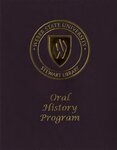| Title |
Noid, Benjamin OH014_003 |
| Creator |
Weber State University, Stewart Library: Oral History Program |
| Contributors |
Noid, Benjamin, Interviewee; Stagg, Jeff, Interviewer; Rands, Lorrie, Technician |
| Collection Name |
Golden Hours Senior Center, Student Project, Oral Histories |
| Description |
The Golden Hours Senior Center provides services to many patrons in Ogden, Utah. In 2014, the public history class conducted oral histories with several of these community members, covering topics such as World War II, education, segregation, Weber State University, Ogden City, and 25th Street during the 1940s and 1950s. These interviews add to the community history of Weber County. |
| Biographical/Historical Note |
The following includes the transcript and a video clip from an oral history interview with Benjamin Noid. |
| Subject |
Universities and colleges; Student activities; College theater; Arts facilities |
| Digital Publisher |
Stewart Library, Weber State University, Ogden, Utah, USA |
| Date |
2014 |
| Date Digital |
2018 |
| Temporal Coverage |
1928; 1929; 1930; 1931; 1932; 1933; 1934; 1935; 1936; 1937; 1938; 1939; 1940; 1941; 1942; 1943; 1944; 1945; 1946; 1947; 1948; 1949; 1950; 1951; 1952; 1953; 1954; 1955; 1956; 1957; 1958; 1959; 1960; 1961; 1962; 1963; 1964; 1965; 1966; 1967; 1968; 1969; 1970; 1971; 1972; 1973; 1974; 1975; 1976; 1977; 1978; 1979; 1980; 1981; 1982; 1983; 1984; 1985; 1986; 1987; 1988; 1989; 1990; 1991; 1992; 1993; 1994; 1995; 1996; 1997; 1998; 1999; 2000; 2001; 2002; 2003; 2004; 2005; 2006; 2007; 2008; 2009; 2010; 2011; 2012; 2013; 2014 |
| Item Size |
35p.; 29cm.; 2 bound transcripts; 4 file folders. 1 video disc: digital; 4 3/4 in. |
| Medium |
oral histories (literary genre) |
| Spatial Coverage |
Ogden, Weber County, Utah, United States, http://sws.geonames.org/11788968, 41.22809, -111.96766 |
| Type |
Text; Image/MovingImage |
| Conversion Specifications |
Transcribed using Express Scribe. Digitally reformatted using Adobe Acrobat Xl Pro. |
| Language |
eng |
| Rights |
Materials may be used for non-profit and educational purposes, please credit University Archives, Stewart Library; Weber State University. |
| Source |
Noid, Benjamin OH14_003; Weber State University, Stewart Library, University Archives |
| Format |
application/pdf; video/mp4 |
| ARK |
ark:/87278/s6m6gbge |
| Setname |
wsu_webda_oh |
| ID |
104236 |
| Reference URL |
https://digital.weber.edu/ark:/87278/s6m6gbge |
| Title |
001Noid, Benjamin OH14_003 |
| Creator |
Weber State University, Stewart Library: Oral History Program |
| Contributors |
Noid, Benjamin, Interviewee; Stagg, Jeff, Interviewer; Rands, Lorrie, Technician |
| Description |
The Golden Hours Senior Center provides services to many patrons in Ogden, Utah. In 2014, the public history class conducted oral histories with several of these community members, covering topics such as World War II, education, segregation, Weber State University, Ogden City, and 25th Street during the 1940s and 1950s. These interviews add to the community history of Weber County. |
| Biographical/Historical Note |
The following is an oral history interview with Benjamin Noid, conducted by Jeff Stagg on March 12, 2014 at the Golden Hours Senior Community Center. Ben discusses his epxeriences with Weber State and all he has done for the University. Lorrie Rands is also present as the recording technician. |
| Subject |
Universities and colleges; Student activities; College theater; Arts facilities |
| Digital Publisher |
Stewart Library, Weber State University, Ogden, Utah, USA |
| Date |
2014 |
| Date Digital |
2018 |
| Temporal Coverage |
1928-2014 |
| Item Size |
35p.; 29cm.; 2 bound transcripts; 4 file folders. 1 video disc: digital; 4 3/4 in. |
| Medium |
oral histories (literary genre) |
| Spatial Coverage |
Ogden, Weber County, Utah, United States, http://sws.geonames.org/11788968, 41.22809, -111.96766 |
| Type |
Text; Image/MovingImage |
| Conversion Specifications |
Transcribed using Express Scribe. Digitally reformatted using Adobe Acrobat Xl Pro. |
| Language |
eng |
| Rights |
Materials may be used for non-profit and educational purposes, please credit University Archives, Stewart Library; Weber State University. |
| Source |
Noid, Benjamin OH14_003; Weber State University, Stewart Library, University Archives |
| Format |
application/pdf |
| Setname |
wsu_webda_oh |
| ID |
104449 |
| Reference URL |
https://digital.weber.edu/ark:/87278/s6m6gbge/104449 |





